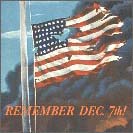(Ambient pool hall sounds.)
ALAN LOMAX: What’s your name?
WILLIAM CLARK: My name is William Clark.
LOMAX: How old are you.
CLARK: I am 16 years old.
LOMAX: Well, tell me about when you first heard about this war, and what you thought when you first heard it.
CLARK: When I first heard about the war, I said to myself: I hope the United States will fight until the last man go down, and. . .in God the Negroes trust. Although many Negro lives will be lost in the war, as was before, I hope the Negro will have much more freedom than they have now.
LOMAX: Tell me what your feeling about this war with Japan is.
WILLIAM KEITH: I say as far as my concern, this country is involved in war, and I think we should be patriotic regardless of creed, color, and condition. I will say, furthermore, I will say that I believe it is a stab in the back, and I hope that this country will wipe her off the face of the world. That’s as much as I have to say about that.
Well this name is Keith, William H. Keith. My occupation is bricklaying for the last 37 years. I don’t believe in Nazism at all. I believe that Adolf Hitler despises every black face that the world has ever known. He is really an enemy to the Negro. That’s my thought about it. And as farthe Jews and the Negroes, they don’t mean nothing in Hitler’s sight. He doesn’t think anything about them. He thinks they’re nothing but a bunch of bums. That’s all to him. And if he had his way with the Negro people of America, I believe he’d come here and annihilate the whole bunch.
(Pool hall sounds fade out.)
(Street sounds fade in.)
INTERVIEWER: How do you feel about it? Do you think we’re going to win?
NORMAN WEISMAN: Well, I’ll be called into the draft pretty soon. I’m eligible, I’m on a 1A classification, and it hit me pretty bad. I was expecting something to happen, but when it did come along, well it does surprise me, didn’t expect it so soon.
INTERVIEWER: Would you speak for us? We’re not going to play this on the air. We want a record in the Library of Congress. What’s your name, please?
ARNOLD PONEMKIN: Oh, Arnold Ponemkin.
INTERVIEWER: How did you feel when you first heard the news about the Japanese attack.
PONEMKIN: Well, I was surprised that it was so sudden
INTERVIEWER: Are you eligible for the draft, too?
PONEMKIN: Yes, I’m in the July draft. I expect to be called any week now.
INTERVIEWER: Are you the lady friend, or can we interview you?
DOROTHY KOTTNER: No
PONEMKIN: No. She’s my friend, though.
INTERVIEWER: What is your name?
KOTTNER: Dorothy Kottner
INTERVIEWER: How did you feel when you first heard the news?
KOTTNER: Well, it really surprised me. No, I thought sure it would be Germany. They have signed, I mean there is war, isn’t there?
INTERVIEWER: That’s right. Sure is, as of 12:30 today.
KOTTNER: Well, I think that’s about the only way out.
INTERVIEWER: How do you feel about this thing as a —
STANLEY HUTT: Well, I tell ya. I didn’t want us to go to war. I mean, like everybody else we’d like to keep out of it. But now that we’re in there I hope go to work on them and really give them something they’ll be sorry for.
INTERVIEWER: Is there anybody else that wouldn’t say a word for us? How did you feel when you first heard the news of the war?
WOMAN: Well, I couldn’t say anything, I didn’t know what to say or think. I didn’t think it was coming on so soon, but I guess we all had a feeling it would be on.
INTERVIEWER: How do you feel now that it has begun? How do you think it’s going to go?
WOMAN: Well, I hope we beat the hell out of ’em.
(Everyone laughs.)
INTERVIEWER: How about if Italy and Germany join?
WOMAN: I think that our air force is strong enough to beat them all.
INTERVIEWER: How about that? The opinion on that. Are we going to win this war?
(Everyone yells at once.)
INTERVIEWER: Has the feeling of the people changed a lot? Have you noticed the people you meet in the street, is there a —
VOICES: Yes it has. Those that were against war.
They’re for it now.
They’re now for it.
The everyday isolationist has changed into an everyday defeatist of Hitler . . . defeatist of Nazism . . . or any -ism . . . outside of Americanism.
INTERVIEWER: All right, sir. Thank you very much. Thank you all.
(Street sounds fade out.)

